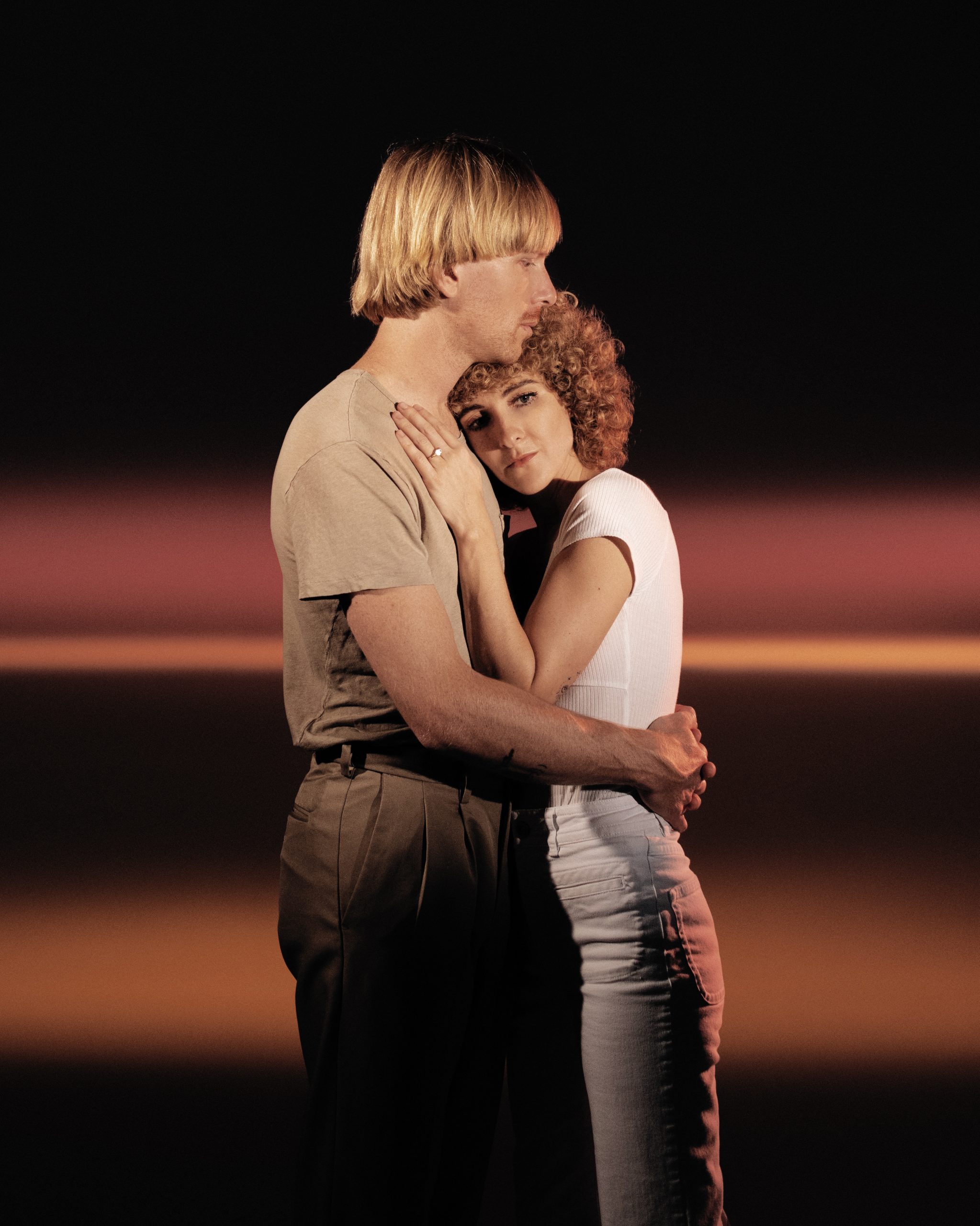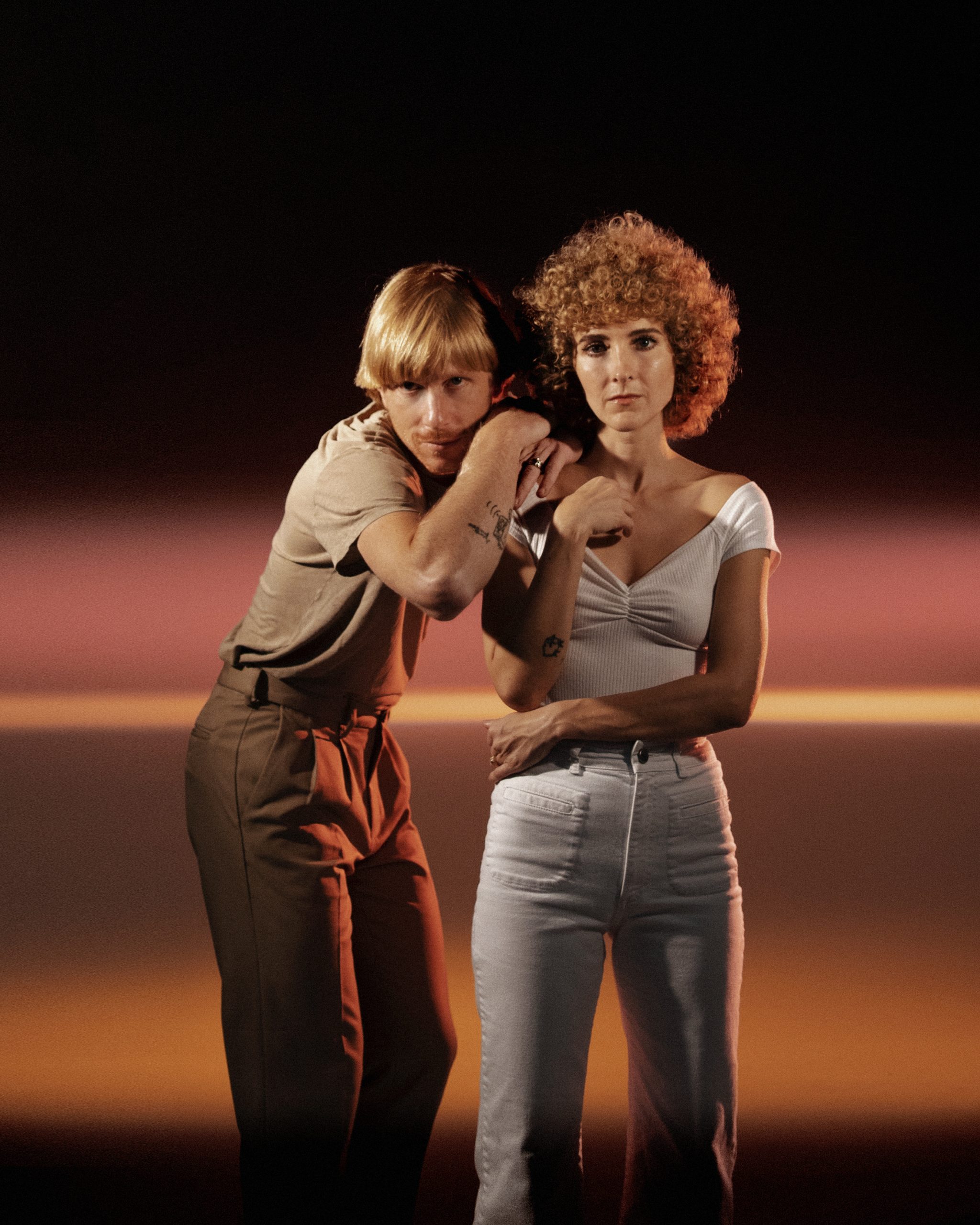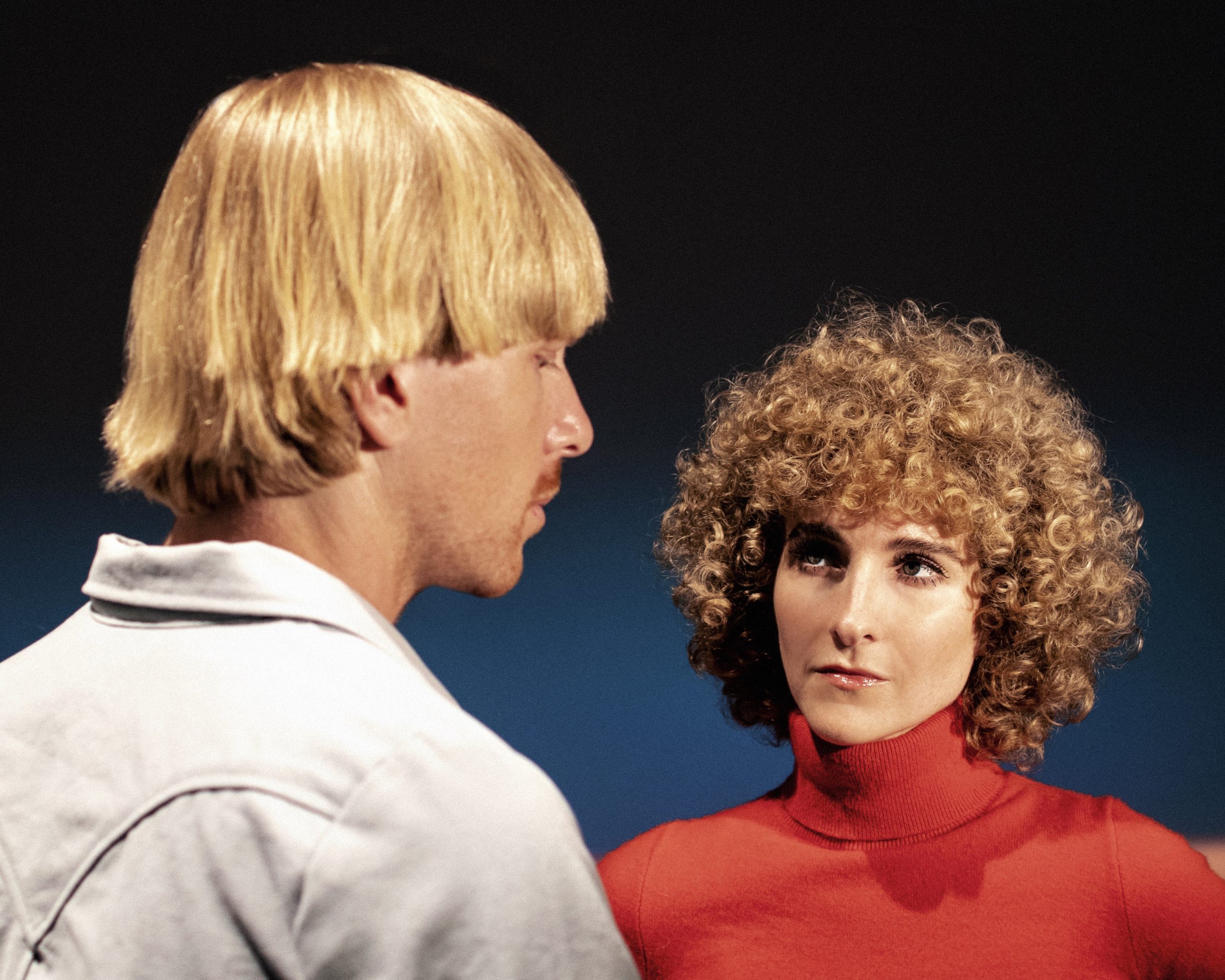
Patrick Riley and Alaina Moore are obsessed with water. The duo, better known as Tennis, are partners in life and art, and have made a name for themselves with haunting, romantic, and inventive indie pop. Their new album Swimmer is an elegant mélange of their influences, and their most upbeat offering to date. With a year full of tours booked (and subsequently cancelled as the pandemic rages), the duo reflect on their year in isolation, recall adventures out on the ocean, and ponder freedom through the image of the swimmer.
***
PATRICK RILEY: Yeah so obviously our whole entire year got cancelled by COVID as with everyone else so we knew we were gonna be doing a livestream at some point to seal the deal on our fate.
ALAINA MOORE: I’ve been really nervous to perform “How To Forgive” live because that was the hardest song for me to sing on the record. I was so worried about it that I took voice lessons to belt that chorus without acting like I’m belting and make it look easy. Do you feel like I pulled it off? Do you feel like I got there?
PR: Do you want me to rank it, zero to ten?
AM: Yeah one to ten, did I get there?
PR: Eleven! I feel like your go to tendency is to undervalue your performance; if you thought you did an eight, you did a twelve.
AM: I always have to be hard on myself so I can always be improving. I’m really proud of you because you had to learn my keyboard part for that one.
PR: How many keyboard parts did you screw up during the performance of the whole set?
AM: Zero.
PR: So Alaina is perfect.
AM: You did screw up.
PR: I know I did!
AM: But you had a lot of other things to worry about because you were also the audio engineer. So you were worrying about whether or not everything was actually being liv- tracked or if some things were being lost from the session.
PR: But it came out…I’m happy about it.
AM: Would you do something like that again?
PR: I think if we’re gonna do it again, it can only be one more time. I feel like it would lose its power or its impact. Once the cat’s out of the bag, there’s no more bag.
AM: Yeah, or cat. They’re both gone.
PR: We literally played to crickets. Right before we started the set, crickets started chirping. Loudest cricket I’ve ever heard.
AM: But it wasn’t one there were like thirty crickets. My vocal mic was so compressed it made them so loud. It picked up all the crickets.
PR: It also was incredibly humiliating.
AM: I thought it was hilarious. I was afraid one was gonna jump on me…
PR: You’re not afraid of snakes or spider; just grasshoppers, crickets, and moths.
AM: And bees.
PR: Oh, and bees. So, I don’t know where your logic is of fear but…
AM: It’s primordial or something. I can’t explain it. I feel like there’s been a really weird parallel between being quarantined at home feels really parallel to our boating trips where it’s just me and you in our little container. I feel like we’ve been passing the time in a similar way which is just through manual labor. We’ve also been watching ‘Survivor’, like survivalist shows alone.
PR: “Naked and Afraid.”
AM: It’s very on topic, very pertinent. For me I feel like something that’s really redemptive about this time is just spending a day literally digging a giant hole in the ground to re-do the fence and putting those fence posts up.
PR: I feel like that’s always been our creative relationship. One side of the coin is us being like these contractors. We both build lots of things and it’s like very manual.
AM: I don’t know it just feels like you’re very—
PR: Grounded?
AM: —in your body, yeah. Obviously being a contractor isn’t very primordial, but working with your hands and feeling like you’re responsible for your own shelter and for your own continued existence is. That’s one of the things that is so appealing about the sailboat: when we’re off somewhere remote, our safety and continued existence is fully dependent on us. Maintaining the boat, knowing how to navigate, following the weather, just being like really on it at every moment, the thrill of a very heightened level of existence. Even though we’re home now in Denver, I had a very similar feeling of you and I trapped alone in here trying to rebuild our home.
PR: How many big projects have we done since we’ve been quarantined?
AM: We rebuilt our bathroom, we rebuilt the fence on our property, we cut down the tree, I learned how to plant things and we regrew all of our grass. It was dead from being on tour all these years and we’ve seeded the yard over and over, a whole lawn from scratch.
PR: We put in a new water heater, reroofed our studio…
AM: We became roofers. I feel like if our band ends at any point we could just play into being a married contractor team.
PR: I feel like we’re either all in on the physical world or we’re all in on the creative world where we’re just like-
AM: Writing?
PR: When you’re writing, I feel like you can’t do anything else and vice versa, if I’m writing I’m just in that world—can’t fix the fence!
AM: I like to move through life in seasons where part of the year is about being in your body, working really hard, being outside building things or whatever. Normally that would be touring ’cause that’s very physical, showing up to places, loading in the gear, soundchecking, playing the shows. Then we have part of the year when we’re writing.
PR: I wanted to ask you about the relationship between writing, creativity, and like ownership of music.
AM: Like, intellectual property?
PR: Yeah! We always talk about, and I feel like this is a subject we still don’t have any clear answers on. Let’s say I write you a song…
AM: Okay…
PR: …and you’re singing it, and it’s my song. When you sing it, is it now your song?
AM: Well I think by the way you framed your question, you’ve made it clear that it’s your song.
PR: No, but I’m just saying that in this world where it’s become more common for people to perform songs that they didn’t write…
AM: Well that’s not something that’s just been now, that’s been like the whole history like the Brill Building was just people farming out songs.
PR: I’m just saying, like, for indie bands now.
AM: I feel like, what’s maybe a better question is if a song was written by ten writers and you wrote one liner, what if the one line you wrote out of the whole song is the most important part? Should you have more rights to the song? Should it be perfectly fractionated out of how much was contributed to the entirety of the whole? I have no idea, that’s interesting. Only you would have an intellectual property interview question that I’m not interested in.
PR: I’m writing a book on the music industry—
AM: —for an audience of few.
PR: This year is really weird for us because this was like our breaking point, I feel like. This is the first year ever where we’re playing huge venues and they were all sold out.
AM: We were about to know what it felt like to be on tour and be comfortable.
PR: I still tour manage, I still drive us everywhere in a fifteen passenger van.
AM: We load in and out every night.
PR: I tune your piano.
AM: You tune my piano! We set everything up.
PR: Literally the day we were renting a tour bus and going on to finish the tour it all got cancelled. The thing I miss most is feeling comfortable touring for the first time in like ten years of being a band.
AM: Well you only got to miss the hope of having it. I think it’s been hard for us because we started off playing really small, DIY shows where we would do everything ourselves. We toured in a Subaru with a three piece band. That was actually pretty sustainable, so the scale was smaller and the stakes were lower. When we got to small theaters, there was an expectation for our production value to be higher but we were still touring the same way with a tiny band doing it all ourselves.
PR: They were definitely the best shows of our entire lives, like by far and away.

AM: You can’t take anything for granted when you’re a self-releasing indie band. This is a tough year to lose, but it’s been a humbling experience. I always knew to not take anything for granted and this year just confirmed that for me.
PR: Obviously we didn’t feel comfortable writing any new music after our tour got cancelled and our whole album cycle got suspended.
AM: Well our album had only been out for like one week.
PR: I know, but I’m just saying, now we’ve both been talking about writing music again and I guess the question I have for you is-
AM: —Copyright laws! Kidding.
PR: Do you feel like there is a song on Swimmer that you want to take that direction into the next release?
AM: “Runner.” I feel like that song is so dense and sophisticated for us. That song was really hard to finish.
PR: It took us six months or something.
AM: Even now when I listen to it every time when the chorus first comes in or when the bridge comes in I’m always surprised. It feels very connected but it’s still so new. Iit’s really hard to write pop-y music that is surprising as it progresses through the song.
PR: Do you think that palette will be important in the next release? Do you think it’s gonna be more heavy? I feel like that song is very Cocteau Twins.
AM: I’m always going to really love the natural sounds like a piano or an acoustic guitar or some really trashy drums.
PR: You were just telling me yesterday that you wanted to buy a classical guitar.
AM: I feel like “Runner” and ‘Need Your Love’ are two examples of similar achievements with different sonic palettes and I would like to pursue both simultaneously. I do think that I’m a better synth player than I realize. I’m interested in different things, I’m interested in going down this road more. I’ve never really cared about synths. I’ve always been on a piano or guitar and now I feel like I’d like to delve more into that world.

PR: I heard you saying the other day that you are interested in making some type of a concept release because maybe we haven’t, but I thought that Swimmer was a concept album.
AM: It was still just really autobiographical.
PR: Do you think the next one won’t be autobiographical?
AM:, I’m starting to feel like I’ve maybe mined my life for as much as I can.
PR: There’s nothing left.
AM:This year I haven’t been able to do any living; I haven’t been able to see people or leave our house. I feel ready to write, but I would rather experiment or actually just write for other people instead of just literally drawing from my own life. Normally touring would give me a lot of material but instead it’s a year of sitting at home, building a fence.What attracts me to the image of a swimmer is that you associate that with freedom and a little bit of the unconscious.
PR: Freedom in the sense of you can go anywhere but you’re also gonna die soon.
AM: I can’t swim, so I am fascinated by the imagery and the concept because I see the freedom that people experience when they can dive and feel free and comfortable in the water, but I don’t have that experience with it. I associate it with dread and terror. We could still see shore and still see it populated with people having a family day on the beach and swimming for fun while we poured your father’s ashes into the ocean. I knew while it was happening that I wanted to write a song about it.
PR: You know some people get like snake tattoos on their feet to cure their fear of snakes. Are you gonna get a swimmer tattooed on you?
AM: No, but maybe making an entire album called Swimmer is close enough. I think it’s funny that we’re Earth Signs that have devoted so much time and energy to the water and the ocean. Our connection to the water is via the boat, and the boat is like all wood. It’s like having earth on the water. I can’t explain it. I want to get as close to my fear as I can without actually touching it.
CONNECT WITH TENNIS
INSTAGRAM // TWITTER // SPOTIFY
photos / Luca Venter
story / E.R. Pulgar
